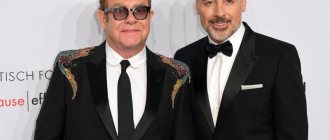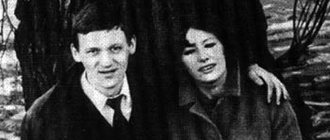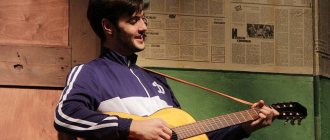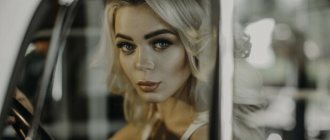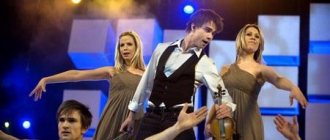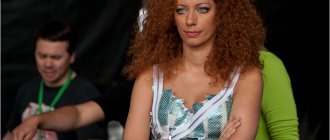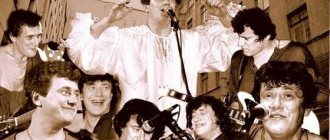Wikipedia has articles about other people with the surname Borzov.
| Nike Borzov | |
| Nike Borzov | |
| basic information | |
| Birth name | Nikolai Vladimirovich Barashko |
| Date of Birth | May 23, 1972(1972-05-23) (age 48) |
| Place of Birth | Vidnoye, USSR |
| Years of activity | 1986–present |
| A country | USSR USSR Russia Russia |
| Professions | singer, composer, poet |
| Genres | alternative rock, indie rock, Britpop, post-punk, punk rock |
| Teams | "", "Infection" |
| Labels | Union, Bullfinches, Gala |
Nike Vladimirovich Borzov
(born May 23, 1972, Vidnoye) is a Soviet and Russian rock musician, poet, singer and songwriter. He is the founder and leader of the punk band “Infection”, but in wider circles he is better known for his solo work.
Biography
Even in his youth, at the age of 14, Nike organized the punk group “Infection”, which existed until 1992. During the existence of the group, two full-length studio albums were recorded: “Onanism” in 1990 and “Hole for the Navel” in 1992.
In parallel with this, Nike took an active part in various projects, both his own and those of others (“Mesopotamia”, “Platonic Prostitution”, “Boofeet”, “Died”, “Special Nurses”, “Norman Bates Fan Club”, etc. .), and also performed with the famous team “X.. kill”. He served in the army for two years: “I learned nothing during this time, I never even fired a machine gun, although I wore one and knew how to assemble and disassemble it.”[1]
He became truly popular after leaving the activities of Infection, changing his style from punk to psychedelic rock.
In 1992, Nike Borzov’s solo career began - his first album “Immersion” was released.
In 1994, a second album entitled “Closed” was released.
In 1995, New Hot Rock magazine described his work as follows: “He sings extremely soulful and romantic songs a kilometer long, burdened with arrangement beauty, but generally leaning towards the hysterical and melancholic style of The Cure. The core of the group is Nike himself and his drummer Lev Kostandyan. One of the main hits is the eleven-minute anthem “Madness, Deceit and a Little Piece of Love”[2].
In 1996, the Infection group turns ten years old. Then, without musicians, Nike recorded the “Infections” album “Take your bitch in your arms” in two days, in which he himself plays all the instruments. The tracks of this album included the song “Horse” for the first time.
In 1997, simultaneously with the release of the album “Puzzle,” the song “Horse” was included in the rotation of radio stations, which aroused the expected public interest and heated discussions. According to the plot of the composition, a small horse transports cocaine. In his own comments, the musician explains the meaning of the song: “A person drives himself into a certain framework, comes up with a certain order of things, which he is subsequently unable to change. He has responsibilities: a family that needs to be supported, a job that he needs to go to in order to support his family, a dacha where he needs to spud something every week, a car that he needs to tinker with in order to go to this very dacha, etc. It turns out that a person is a workhorse, a horse-man pulling a cart with his happiness, a horse carrying cocaine.” After several bans on the air, the word “cocaine” was replaced by various sounds and other words, for example, plasticine, niacok (cocaine in reverse), which was again a win-win production move, as it attracted even more unhealthy public interest in the “forbidden” and now encrypted topics. According to Nike, the song was written while serving in the army and "was dictated by the circumstances in which I existed there." Nike claims that he has not tried cocaine, but instead prefers sports and fishing. “I just used a word that I liked. It was possible to use any other “ins” in the song, but, in my opinion, cocaine fits better.”[3]
In 2000, the musician’s fourth studio album, “Superman,” was released. The songs “Riding on a Star” and “Three Words” were filmed and, in addition to radio stations, began to be broadcast by major television channels, Nike Borzov became a star on an all-Russian scale. Soon followed by the maxi-single “Lowadka”, composed of various remixes of the artist’s most popular song, as well as the fifth album Supermend. SupermEND is an alternative re-release of the Superman album.
At the end of 2000, authoritative Russian media: OM magazine, Izvestia newspaper and Maximum radio called Nike Borzov performer of the year.
In 2001, the song “Quarrel” was included in the soundtrack to Roman Kachanov’s film Down House. The video for it was shot by the leading actor in the film Down House, the son of the famous Russian director Sergei Bondarchuk, actor and director, Fyodor Bondarchuk.
March 2001. Nike Borzov's "SupermEND" concert of the year in the famous Moscow concert hall "Gorbushka" became the final for the "SupermEND" tour and put an end to the history of the 2000 "Superman" trilogy. It included the album “Superman”, the maxi-single “Horse”, and the expanded re-release of “SupermanEND”. In addition to songs from these three records, the concert featured little-known songs from Nike’s early solo albums, as well as the song “Dead Mane” by the group “Infection” in a duet with Arkhip Akhmeleev. Shortly before the concert, the song “Three Words” was discussed for two hours at a plenary session by deputies of the State Duma of the Russian Federation. In response, Nike personally invited the State Duma speaker to his concert. Soon after the concert she released VHS “Naik Borzov. SupermEND. Concert at Gorbushka. In the film by Felix Zelinsky, in addition to concert filming, the viewer can expect inventive animation by Andrei Vradiy and Andrei Airapetov, as well as two videos by Nike Borzov - “Horse No. 2” (remix of “Species of Fish”) and “The Last Song”.
At this time, work was already underway on the new album Splinter
, the veil over which was first lifted by the maxi-single “NUS in Am”. As a b-side, it included the song “Day as Day” and Gleb Orlov’s video for this song. As a result, “Day as Day” was not included in the album, but the clip settled for a long time in the charts of the Muz-TV and MTV-Russia television channels.
In the fall of 2002, when the song “She is the One” became one of the “main hits of the year”, and the video shot for it by director Gosha Taidze was in rotation on MTV-Russia, Nike finished work on the new album, a few days before began producing records by recording the track “Kingsize” in a duet with Dolphin.
After the fairly successful album Splinter
, released in 2002, the singer went silent for several years, devoting himself to his family and various side projects. For example, in 2003, he played the main role in the play “Nirvana” by Yuri Grymov, where he played Kurt Cobain[4]. At the same time, the single “For the Sake of Love” was launched on Maximum radio, where after some time it took first place in the “Hit Parade of Two Capitals”. On December 29, on the MTV Russia channel in the Expresso program, the premiere of the video “Market Horse” took place, in which Borzov’s famous composition was mixed with the song “Metko” by the pop duet “Guests from the Future.” The video, compiled from various concert footage, was created by channel producer Alexey Muravyov and electronic musician DJ Groove.
In 2004, Nike produced the album of his wife Ruslana Borzova, and also worked in a project called “Mutant Beavers,” defining the group’s genre as “neo-punk with trance elements.”
On November 18, 2005, the Moscow club “Young Guard” hosted a performance by the group “One rythmical ritual” - a joint project of artist Vadim Stashkevich, musician and composer Nike Borzov and the Mokhsira theater studio. The theatrical and ritual performance “The Mysteries of Sagaalgan” was shown.
On November 26, 2005, a presentation of “DVD 10” by Nike Borzov took place at the Moscow club “Apelsin”. The disc contains 10 video clips created during collaboration with. At the end of 2005, the Mutant Beavers project came to an end.
On March 14, 2006, the premiere of the romantic film story “Kostyanika. Summer time" . The soundtrack to the film included the song “Dreams” by Nike Borzov.
On December 14, 2006, a presentation of the collection of the best songs “The Best Infections For Girls” by the group “Infection” took place at the Moscow club “Ikra”. The presentation of the new record took place with the participation of the groups “Kh..y Zabey”, “Time to Shit” and the revived “Infection”.
On December 1, 2007, the Gorbushkin Dvor shopping center hosted a presentation of Ruslana Borzova’s debut album “Magic,” on which Nike worked as a music producer.
On April 4, 2007, at a concert in Orange, Nike Borzov will present the animated film “Player,” which is based on the song “Et.” Svetlana Andrianova and Svetlana Elchaninova, animators of the Re-animation project, admit that it was Nike’s music that inspired them to create this cartoon. The video is so harmoniously combined with the music that viewers accept “Player” as the official video for the song “Et”
In January 2008, the musician presented to the public the song “Wind,” a fast melodic composition with dark romantic lyrics, for which Mikhail Abanin immediately shot a video clip[5]. The video was included in the rotation of the A-One TV channel, and the Internet version of the clip soon appeared on the website of the Afisha magazine. In November 2008, he finished recording the original soundtrack for Hunter Thompson’s audiobook “Fear and Loathing in Las Vegas,” which he himself voiced together with Arkhip Akhmeleev[6]. At the same time he took part in the creation of Nau Boom
, a tribute to the group “Nautilus Pompilius”, where he performed the song “Who Else” from the album “Wings”. At the end of 2006, Borzov unfrozen the “Infection” project, and in February he shot a video for the song “Black Hole” starring Barbie Punk Rock.
March 2009 The audiobook “Fear and Loathing in Las Vegas” goes on sale.
On May 6 in St. Petersburg "Orlandina" and on June 7 in Moscow "Ikra" the group will present the new album "Terrified and Bowed." The album contains new songs, as well as several re-recorded tracks from the early Infection period. In the same year, the aforementioned tribute album “the Beautiful Monsters” was released, which contains tracks from young artists who were largely influenced by the Infection. The release of the tribute is accompanied by a presentation at a Moscow club.
After this, the group announces its breakup. A columnist for the newspaper Moskovsky Komsomolets, reflecting on the reasons for the collapse of Infection, o[7].
For 2010, Nike planned the album “From the Inside,” his first solo disc after an eight-year break. The release of the album was preceded by a limited gift single “Rejoice”; the song was already aired on several stations in February, in particular, it was included in the “Hit Parade of Two Capitals” on Radio Maximum, where it stayed for fifteen weeks, ten of which were in first place. On April 23, his official presentation took place at the Moscow club “Ikra”, as well as the premiere screening of the first part of the film “The Observer”, which consists of recordings shot with an amateur camera, where the musician tells the viewer about what he has been doing for the last eight years. In August, the song “Shadows and Flickers” was launched on radio stations, television channels and on the Internet, immediately entered the chart of Our Radio and rose to third place in it. The video for the song, directed by Nike Borzov himself, was highly praised by fans and critics. The album itself was released in October as a +DVD edition and was accompanied by a concert in the same club “Ikra”. The performance consisted of two parts, in the first 13 new tracks were performed, in the second old hits from past releases were played. A columnist for Rolling Stone magazine described the songs presented on the disc as “surprisingly light and romantic,” noting regarding the sublime romanticism that “such themes in pop or pop rock suffer from unbearable falsehood, but in the case of Nike it sounds completely organic and natural.”[8] .
On June 8, 2011, a video for the song “Chelnaper” was released. The atmospheric animated work of director Pavel Egorov perfectly conveys the mood and meaning of the song from the depressive and decadent part of the album “From Within”.
On October 26, 2011, a video for the song “Fresh Blood” was released. Oddly enough, it was with this song in 2007 that listeners began to become acquainted with the material of Nike’s first album in eight years, “From the Inside.” The video was created in the “trash-glam” style, which combines the primary symbols of rock-n-roll music.
In September 2012, Nike completed work on the video for the song “Where the Thread Broke.” An atmospheric story about the search and disappointments that arise along the way became the final stage of the “From the Inside” stage.
In April 2014, he released the album “Everywhere and Nowhere”, after which he began recording a collection of the best songs, released on December 12, 2014.
Personal life of Nike Borzov
Ruslana Eremeeva-Borzova is the singer’s wife.
The marriage produced a daughter, Victoria. Now she is a schoolgirl. Ruslana opened a vocal school. The couple is divorced, however, this does not at all prevent Nike from raising a child. Borzov collects all sorts of writings about himself. According to him, this is interesting, since he finds a lot of invented plots and all sorts of nonsense.
Nike Borzov began his path to the top of professional show business with the organization of the punk group “Infection” in 1986, which existed until 1992 and managed to release two full-length albums: “Onanism” (1990) and “Hole for the Navel” (1992).
Nike Borzov began his path to the top of professional show business with the organization of the punk group “Infection” in 1986, which existed until 1992 and managed to release two full-length albums: “Onanism” (1990) and “Hole for the Navel” (1992). Having at different times taken part in such projects as “Mesopotamia”, “Platonic Prostitution”, “Buufeet”, “Died”, “Special Nurses”, “Norman Bates Fan Club”, as well as in the notorious Moscow region group “Khui Zabey” , Nike recorded his first solo disc, Immersion, in the early 90s.
Then the albums “Closed” (1994) and “Puzzle” (1997) were released with the song “Horse”, which provoked controversy among program directors of all radio stations due to the mention of cocaine in it. Oleg Nesterov played a huge role in Nike’s fate, publishing his fourth album “Superman” (2000) on his label “Bullfinches-Music”. The hits from this record “Riding on a Star” and “The Last Song” were such a stunning success that the maxi-single “Horse” was released in its wake. The unfortunate word was removed from the song, and it became truly popular. Members of the disbanded group “Masha and the Bears” helped the musician with the recording.
In the same year, 2000, Nike Borzov performed at the Fuzz Prize concert, where the ten thousandth Anniversary sang along with him. His superstar status was confirmed by his performances at the “Invasion-2000” festival and the “Brother-2” music show.
In March 2001, Nike gave a solo concert at the Gorbunov House of Culture, and in the summer he played again at the “Invasion”. Nike's third performance in a row in Ramenskoye took place in August 2002, after which the musician began work on his next disc. And already in the fall, his fourth album “Splinter” was released, which attracted the attention of the serious music press and received high praise from critics. A large-scale tour in support of the album ended in the spring of 2003 at the Gorbunov House of Culture.
Influence
At the turn of the 1990s and early 2000s, Nike Borzov was considered one of the most prominent representatives of indie rock[14] in Russia, and after the success of the albums “Puzzle”, “Superman” and “Splinter”[15] he was a notable performer and in pop music. Nowadays he is considered a cult figure in the Russian alternative genre. The press called him “the Russian Pete Dougherty”[7], in particular because of the lyrics of the group “Infection”, which also became iconic in the history of Russian punk[16]. We are also revered among Russian underground music[17].
Personal life
Nike Borzov is a public figure. His biography is known to journalists, but the musician manages to hide his personal life. It is known about his marriage with Ruslana. In union with the vocalist, Borzov had a daughter, Victoria. The couple has no more children together.
The musician easily won the sympathy of the fair sex, and his character and love of freedom ran counter to his wife’s perception of the ideals of family life. The Borzovs separated, but maintain friendly relations for the sake of their daughter.
Nike spends time with the heiress and takes care of her. After the divorce, he managed to maintain a trusting and friendly relationship with his ex-wife. Now Ruslana is immersed in managing her own vocal school in Moscow.
Video
- DVD 10 - a collection of clips filmed between 1999 and 2003 (2005)
- DVD 13 - additional collection of clips (2009)
- “The Observer” - a self-developing auto film (2010 - ...)
Singles
- Maxi-single “LOWADKA” (2000)
- Maxi-single “NUS in Am” (2001)
- International collection of remixes “RADI LUBVI” (2004)
- Original soundtrack for the audiobook "Fear and Loathing" (2008)
- Single “Rejoice” (2010)
- Single "Biomatter" (2013)
Notes
- Polina Velichko.
[www.rollingstone.ru/articles/5410 Army Pie] // Rolling Stone Russia. - May 2008. - No. 47. - Kim Voloshin
Club groups from Moscow and not from Moscow // New Hot Rock. - 1995. - No. 3-4. — P. 9. - Yulia Zharova
Fools and paths // Rolling Stone. - 2006. - May (No. 23). — P. 16. - Andrey Truman.
[www.izvestia.ru/culture/article40961/ Nike Borzov entered “Nirvana” at the Mayakovsky Theater]. Izvestia (November 12, 2003). Retrieved December 16, 2010. [www.webcitation.org/68AeFf7cc Archived from the original on June 4, 2012]. - Sergei Kolesnikov.
[www.rollingstone.ru/articles/3936 Nike Borzov “Wind”] // Rolling Stone Russia. — February 8, 2009. - Alexey Mazhaev.
[www.shoowbiz.ru/musicnews/7015.html Nike Borzov - “From the Inside”]. Showbiz.Ru (November 17, 2010). Retrieved December 15, 2010. [www.webcitation.org/68AeHpU9a Archived from the original on June 4, 2012]. - ↑ 1 2 Andrey Vradiy.
[www.mk.ru/culture/article/2010/08/25/525281-nayk-borzov-zavyazal-s-pankom.html Nike Borzov quit with punk] // Moskovsky Komsomolets. - August 26, 2010. - No. 25433. - Andrey Bukharin
[www.rollingstone.ru/articles/9028/26.7 Nike Borzov - “From the Inside”] // Rolling Stone Russia. - No. 70. - Guru Ken.
[Nike Borzov: “I love it when people share with others what they do well!” newsmuz.com/news_2_959.htm]. NEWSmuz.com (July 21, 2005). Retrieved December 13, 2014. - [ural.kp.ru/daily/24494/648600/ Nike Borzov in Yekaterinburg: “In order to survive, I do not have the right to bring innovative things to the end!”]. Komsomolskaya Pravda (May 22, 2010). Retrieved December 13, 2014.
- [www.cosmo.ru/psychology/psychology/imenno-tak/ Exactly!]. Cosmopolitan. Retrieved December 13, 2014.
- ↑ 123
[b2club.ru/club/best/nike-borzov/ Nike Borzov on the website of the B2 club]. Retrieved December 13, 2014. - [www.seti.ee/modules/news/article.php?storyid=26972 How to choose a star nickname]. Retrieved December 13, 2014.
- [www.gazeta.ru/culture/2015/07/21/a_7651733.shtml Nike Borzov // Newspaper. Ru]
- [volna.afisha.ru/heroes/nayk-borzov-o-novom-albome-pustote-fabrike-zvezd-i-mirovom-pravitelstve/ Nike Borzov - about the new album, emptiness, “Star Factory” and the world government]
- [www.nneformat.ru/reviews/?id=5346 Infection, 2009. Our NeFormat]
- [www.rollingstone.ru/music/review/19621.html Nike Borzov - “Everywhere and Nowhere” - Rolling Stone magazine]
Childhood and youth
It seems that the unusual name Nike is a pseudonym. Some media outlets claimed that the musician’s name is Nikolai Barashko. In an interview, the musician repeatedly commented on rumors, assuring that his data in his passport remains unchanged from the moment he received the document. The musician said that his parents did not give him a name until he was three years old. All this time the child was called “baby.” By the age of three, the father decided to name his son Nike. Music critics suggest that the name was invented by analogy with Mike Naumenko or Nick Rock and Roll.
Musician Nike Borzov
Nike Borzov was born on May 23, 1972 in the village of Vidnoye, Moscow Region, into the family of a well-known rock musician in narrow circles. The boy received creative inclinations at birth, and from childhood he set his social circle in a certain way. My father instilled a taste for music.
The boy often came into confrontation with his family, showing love of freedom and perseverance. He never did anything he didn't like or found boring. Thus, studying was an activity that was not considered attractive. But creativity filled Borzov’s life. Young Nike spent all his free time with friends, listening or playing music.
Nike Borzov in childhood
He was a difficult teenager and after yet another showdown with his parents, he simply left home. The son was found with a friend a few days later. The young man was overcome by a hangover. To avoid a repeat of the situation, Nike was given freedom, and the guy built a new system of priorities for himself, forgetting about school.
At the age of 14 he created his first rock band. “Infection” was provocative and shocking, the defiant slogan of a rebel. The team existed for 4 years, after which Nike took up a solo career. Despite the short-term collaboration, the band's musicians released 2 albums, which gave them their first success. Borzov managed to serve in the army, work with various rock bands and change direction in music. After leaving punk, he switched to the psychedelic rock genre.
Links
- [naikborzov.com zov.com]
- [music.yandex.ru/artist/41092/ Songs by Nike Borzov] on Yandex.Music
- [insidernews.ru/72474 news.ru/72474] Nike Borzov: “It’s good where we are.” Interview
- [www.lookatme.ru/users/naikborzov01 Nike Borzov] on lookatme
- [www.weborama.fm/#/music/%D0%9D%D0%B0%D0%B9%D0%BA_%D0%91%D0%BE%D1%80%D0%B7%D0%BE%D0% B2/%D0%92%D0%B5%D0%B7%D0%B4%D0%B5_%D0%B8_%D0%9D%D0%B8%D0%B3%D0%B4%D0%B5/ Everywhere and nowhere ], 2014 on [www.weborama.fm/#/index/ Weborama]
Excerpt characterizing Borzov, Nike Vladimirovich
Prince Andrei hastily stood up, listened to what the officers had to convey to him, gave them some more orders and was about to let them go, when a familiar, whispering voice was heard from behind the barn. - Que diable! [Damn it!] - said the voice of a man who bumped into something. Prince Andrei, looking out of the barn, saw Pierre approaching him, who tripped on a lying pole and almost fell. It was generally unpleasant for Prince Andrei to see people from his world, especially Pierre, who reminded him of all those difficult moments that he experienced on his last visit to Moscow. - That's how! - he said. - What destinies? I didn't wait. While he was saying this, in his eyes and the expression of his whole face there was more than dryness - there was hostility, which Pierre immediately noticed. He approached the barn in the most animated state of mind, but when he saw the expression on Prince Andrei’s face, he felt constrained and awkward. “I arrived... so... you know... I arrived... I’m interested,” said Pierre, who had already senselessly repeated this word “interesting” so many times that day. “I wanted to see the battle.” - Yes, yes, what do the Masonic brothers say about the war? How to prevent it? - said Prince Andrei mockingly. - Well, what about Moscow? What are mine? Have you finally arrived in Moscow? – he asked seriously. - We've arrived. Julie Drubetskaya told me. I went to see them and didn’t find them. They left for the Moscow region. The officers wanted to take their leave, but Prince Andrei, as if not wanting to remain face to face with his friend, invited them to sit and drink tea. Benches and tea were served. The officers, not without surprise, looked at the thick, huge figure of Pierre and listened to his stories about Moscow and the disposition of our troops, which he managed to travel around. Prince Andrei was silent, and his face was so unpleasant that Pierre addressed himself more to the good-natured battalion commander Timokhin than to Bolkonsky. - So, did you understand the entire disposition of the troops? - Prince Andrei interrupted him. - Yes, that is, how? - said Pierre. “As a non-military person, I can’t say that I completely, but I still understood the general arrangement.” “Eh bien, vous etes plus avance que qui cela soit, [Well, you know more than anyone else.],” said Prince Andrei. - A! - Pierre said in bewilderment, looking through his glasses at Prince Andrei. - Well, what do you say about the appointment of Kutuzov? - he said. “I was very happy about this appointment, that’s all I know,” said Prince Andrei. - Well, tell me, what is your opinion about Barclay de Tolly? In Moscow, God knows what they said about him. How do you judge him? “Ask them,” said Prince Andrei, pointing to the officers. Pierre looked at him with a condescendingly questioning smile, with which everyone involuntarily turned to Timokhin. “They saw the light, your Excellency, as your Serene Highness did,” Timokhin said, timidly and constantly looking back at his regimental commander. - Why is this so? – asked Pierre. - Yes, at least about firewood or feed, I’ll report to you. After all, we were retreating from the Sventsyans, don’t you dare touch a twig, or some hay, or anything. After all, we are leaving, he gets it, isn’t it, your Excellency? - he turned to his prince, - don’t you dare. In our regiment, two officers were put on trial for such matters. Well, as His Serene Highness did, it just became so about this. They saw the light... - So why did he forbid it? Timokhin looked around in confusion, not understanding how or what to answer such a question. Pierre turned to Prince Andrei with the same question. “And so as not to ruin the region that we left to the enemy,” said Prince Andrei with malicious mockery. – This is very thorough; The region must not be allowed to be plundered and the troops must not be accustomed to looting. Well, in Smolensk, he also correctly judged that the French could get around us and that they had more forces. But he couldn’t understand that,” Prince Andrei suddenly shouted in a thin voice, as if breaking out, “but he couldn’t understand that we fought there for the first time for Russian land, that there was such a spirit in the troops that I had never seen, that We fought off the French for two days in a row and that this success increased our strength tenfold. He ordered a retreat, and all efforts and losses were in vain. He didn’t think about betrayal, he tried to do everything as best as possible, he thought it over; but that’s why it’s no good. He is no good now precisely because he thinks everything over very thoroughly and carefully, as every German should. How can I tell you... Well, your father has a German footman, and he is an excellent footman and will satisfy all his needs better than you, and let him serve; but if your father is sick at the point of death, you will drive away the footman and with your unusual, clumsy hands you will begin to follow your father and calm him down better than a skilled but stranger. That's what they did with Barclay. While Russia was healthy, a stranger could serve her, and she had an excellent minister, but as soon as she was in danger; I need my own, dear person. And in your club they made up the idea that he was a traitor! The only thing they will do by slandering him as a traitor is that later, ashamed of their false accusation, they will suddenly make a hero or a genius out of the traitors, which will be even more unfair. He is an honest and very neat German... “However, they say he is a skilled commander,” said Pierre. “I don’t understand what a skilled commander means,” said Prince Andrey with mockery. “A skillful commander,” said Pierre, “well, the one who foresaw all the contingencies... well, guessed the thoughts of the enemy.” “Yes, this is impossible,” said Prince Andrei, as if about a long-decided matter. Pierre looked at him in surprise. “However,” he said, “they say that war is like a chess game.” “Yes,” said Prince Andrei, “only with this small difference that in chess you can think about every step as much as you like, that you are there outside the conditions of time, and with this difference that a knight is always stronger than a pawn and two pawns are always stronger.” one, and in war one battalion is sometimes stronger than a division, and sometimes weaker than a company. The relative strength of the troops cannot be known to anyone. Believe me,” he said, “if anything depended on the orders of the headquarters, I would have been there and made the orders, but instead I have the honor of serving here, in the regiment with these gentlemen, and I think that we really tomorrow will depend, not on them... Success has never depended and will not depend on position, weapons, or even numbers; and least of all from the position. - And from what? “From the feeling that is in me, in him,” he pointed to Timokhin, “in every soldier.” Prince Andrei looked at Timokhin, who looked at his commander in fear and bewilderment. In contrast to his previous restrained silence, Prince Andrei now seemed agitated. He apparently could not resist expressing those thoughts that unexpectedly came to him. – The battle will be won by the one who is determined to win it. Why did we lose the battle at Austerlitz? Our loss was almost equal to that of the French, but we told ourselves very early that we had lost the battle - and we lost. And we said this because we had no need to fight there: we wanted to leave the battlefield as quickly as possible. “If you lose, then run away!” - we ran. If we hadn’t said this until the evening, God knows what would have happened. And tomorrow we won’t say this. You say: our position, the left flank is weak, the right flank is stretched,” he continued, “all this is nonsense, there is none of this.” What do we have in store for tomorrow? A hundred million of the most varied contingencies that will be decided instantly by the fact that they or ours ran or will run, that they will kill this one, they will kill the other; and what is being done now is all fun. The fact is that those with whom you traveled in position not only do not contribute to the general course of affairs, but interfere with it. They are busy only with their own small interests. - At such a moment? - Pierre said reproachfully. “At such a moment,” repeated Prince Andrei, “for them it is only such a moment in which they can dig under the enemy and get an extra cross or ribbon.” For me, for tomorrow this is this: a hundred thousand Russian and a hundred thousand French troops came together to fight, and the fact is that these two hundred thousand are fighting, and whoever fights angrier and feels less sorry for himself will win. And if you want, I’ll tell you that, no matter what it is, no matter what is confused up there, we will win the battle tomorrow. Tomorrow, no matter what, we will win the battle! “Here, your Excellency, the truth, the true truth,” said Timokhin. - Why feel sorry for yourself now! The soldiers in my battalion, would you believe it, didn’t drink vodka: it’s not such a day, they say. - Everyone was silent. The officers stood up. Prince Andrei went out with them outside the barn, giving the last orders to the adjutant. When the officers left, Pierre approached Prince Andrei and was just about to start a conversation when the hooves of three horses clattered along the road not far from the barn, and, looking in this direction, Prince Andrei recognized Wolzogen and Clausewitz, accompanied by a Cossack. They drove close, continuing to talk, and Pierre and Andrey involuntarily heard the following phrases: “Der Krieg muss im Raum verlegt werden.” Der Ansicht kann ich nicht genug Preis geben, [War must be transferred to space. I cannot praise this view enough (German)] - said one. “O ja,” said another voice, “da der Zweck ist nur den Feind zu schwachen, so kann man gewiss nicht den Verlust der Privatpersonen in Achtung nehmen.” [Oh yes, since the goal is to weaken the enemy, the losses of private individuals cannot be taken into account (German)] - O ja, [Oh yes (German) ] - confirmed the first voice. “Yes, im Raum verlegen, [transfer into space (German)],” Prince Andrei repeated, snorting angrily through his nose, when they passed. – Im Raum then [In space (German)] I still have a father, a son, and a sister in Bald Mountains. He doesn't care. This is what I told you - these German gentlemen will not win the battle tomorrow, but will only spoil how much their strength will be, because in his German head there are only arguments that are not worth a damn, and in his heart there is nothing that is only and what is needed for tomorrow is what is in Timokhin. They gave all of Europe to him and came to teach us - glorious teachers! – his voice squealed again. – So you think that tomorrow’s battle will be won? - said Pierre. “Yes, yes,” said Prince Andrei absently. “One thing I would do if I had power,” he began again, “I would not take prisoners.” What are prisoners? This is chivalry. The French have ruined my house and are going to ruin Moscow, and they have insulted and insulted me every second. They are my enemies, they are all criminals, according to my standards. And Timokhin and the entire army think the same. We must execute them. If they are my enemies, then they cannot be friends, no matter how they talk in Tilsit. “Yes, yes,” said Pierre, looking at Prince Andrei with sparkling eyes, “I completely, completely agree with you!” The question that had been troubling Pierre since Mozhaisk Mountain all that day now seemed to him completely clear and completely resolved. He now understood the whole meaning and significance of this war and the upcoming battle. Everything he saw that day, all the significant, stern expressions on faces that he glimpsed, were illuminated for him with a new light. He understood that hidden (latente), as they say in physics, warmth of patriotism, which was in all those people whom he saw, and which explained to him why all these people were calmly and seemingly frivolously preparing for death. “Take no prisoners,” continued Prince Andrei. “This alone would change the whole war and make it less cruel.” Otherwise we were playing at war - that’s what’s bad, we’re being generous and the like. This is generosity and sensitivity - like the generosity and sensitivity of a lady who becomes sick when she sees a calf being killed; she is so kind that she cannot see the blood, but she eats this calf with gravy with appetite. They talk to us about the rights of war, about chivalry, about parliamentarianism, to spare the unfortunate, and so on. It's all nonsense. I saw chivalry and parliamentarianism in 1805: we were deceived, we were deceived. They rob other people's houses, pass around counterfeit banknotes, and worst of all, they kill my children, my father, and talk about the rules of war and generosity towards enemies. Don't take prisoners, but kill and go to your death! Who came to this the way I did, through the same suffering... Prince Andrei, who thought that he didn’t care whether they took Moscow or not, the way they took Smolensk, suddenly stopped in his speech from an unexpected spasm that grabbed him by the throat. He walked several times in silence, but his eyes shone feverishly and his lip trembled when he began to speak again: “If there were no generosity in war, then we would only go when it was worth going to certain death, as now.” Then there would be no war because Pavel Ivanovich offended Mikhail Ivanovich. And if there is a war like now, then there is a war. And then the intensity of the troops would not be the same as it is now. Then all these Westphalians and Hessians, led by Napoleon, would not have followed him to Russia, and we would not have gone to fight in Austria and Prussia, without knowing why. War is not a courtesy, but the most disgusting thing in life, and we must understand this and not play at war. We must take this terrible necessity strictly and seriously. That's all there is to it: throw away the lies, and war is war, not a toy. Otherwise, war is the favorite pastime of idle and frivolous people... The military class is the most honorable. What is war, what is needed for success in military affairs, what are the morals of military society? The purpose of war is murder, the weapons of war are espionage, treason and its encouragement, the ruin of the inhabitants, their robbery or theft to feed the army; deception and lies, called stratagems; the morals of the military class - lack of freedom, that is, discipline, idleness, ignorance, cruelty, debauchery, drunkenness. And despite this, this is the highest class, respected by everyone. All kings, except the Chinese, wear a military uniform, and the one who killed the most people is given a large reward... They will come together, like tomorrow, to kill each other, kill, maim tens of thousands of people, and then they will serve thanksgiving services for having beaten there are many people (whose number is still being added), and they proclaim victory, believing that the more people are beaten, the greater the merit. How God looks and listens to them from there! – Prince Andrei shouted in a thin, squeaky voice. - Oh, my soul, lately it has become difficult for me to live. I see that I have begun to understand too much. But it is not good for a person to eat from the tree of the knowledge of good and evil... Well, not for long! - he added. “However, you are sleeping, and I don’t care, go to Gorki,” Prince Andrei suddenly said. - Oh no! - Pierre answered, looking at Prince Andrei with frightened, compassionate eyes. “Go, go: you need to get some sleep before the battle,” repeated Prince Andrei. He quickly approached Pierre, hugged him and kissed him. “Goodbye, go,” he shouted. “See you, no...” and he quickly turned around and went into the barn. It was already dark, and Pierre could not make out the expression that was on Prince Andrei’s face, whether it was angry or tender. Pierre stood silently for some time, wondering whether to follow him or go home. “No, he doesn’t need it! “Pierre decided to himself, “and I know that this is our last date.” He sighed heavily and drove back to Gorki. Prince Andrey, returning to the barn, lay down on the carpet, but could not sleep. He closed his eyes. Some images were replaced by others. He stopped at one for a long time, joyfully. He vividly remembered one evening in St. Petersburg. Natasha, with a lively, excited face, told him how last summer, while out picking mushrooms, she got lost in a large forest. She incoherently described to him the wilderness of the forest, and her feelings, and conversations with the beekeeper whom she had met, and, interrupting every minute in her story, she said: “No, I can’t, I’m not telling it like that; no, you don’t understand,” despite the fact that Prince Andrei reassured her, saying that he understood, and really understood everything she wanted to say. Natasha was dissatisfied with her words - she felt that the passionately poetic feeling that she experienced that day and which she wanted to turn out did not come out. “This old man was such a charm, and it was so dark in the forest... and he was so kind... no, I don’t know how to tell,” she said, blushing and worried. Prince Andrey smiled now with the same joyful smile that he smiled then, looking into her eyes. “I understood her,” thought Prince Andrei. “Not only did I understand, but this spiritual strength, this sincerity, this spiritual openness, this soul of hers, which seemed to be connected by her body, I loved this soul in her... I loved her so much, so happily...” And suddenly he remembered about how his love ended. “He didn’t need any of this. He didn't see or understand any of this. He saw in her a pretty and fresh girl, with whom he did not deign to throw in his lot. And I? And he is still alive and cheerful.” Prince Andrei, as if someone had burned him, jumped up and began to walk in front of the barn again. On August 25, on the eve of the Battle of Borodino, the prefect of the palace of the French Emperor, Mr. de Beausset, and Colonel Fabvier arrived, the first from Paris, the second from Madrid, to Emperor Napoleon in his camp at Valuev.
